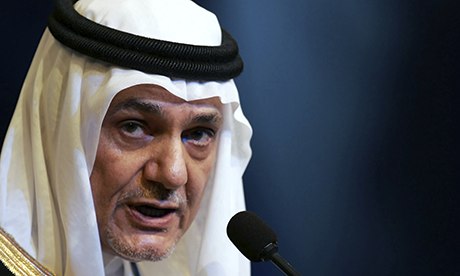
The speeches and writings of senior figures such as Prince Turki al-Faisal – the former head of Saudi intelligence – suggest that Saudi Arabia wants to ensure a resurgent Iran does not dislodged it as the region’s dominant power. Photograph: Hassan Ammar/Getty Images
Saudi Arabia feels double-crossed and is determined to contest a resurgent Iran. Could Europe replace the US in Riyadh's affections?
Of the two states most unhappy about the interim agreement with Iran, Israel is generally seen as potentially the more dangerous. This may not be correct. In the longer run, the hostility of Saudi Arabia could present the greater threat to regional stability.
This is not to underestimate Israel's genuine and deeply held fears about the peril that a nuclear-armed Iran would present. How could it feel otherwise, given the extravagant language of Iran's former president, Mahmoud Ahmadinejad, and its own still disputed position in the region. For all its fierce rhetoric, though, there are constraints on Israel, including its reliance on the US and the caution of its own military, that may make it less likely to resort to arms against Iran than many outsiders believe. In the end, it could be Saudi Arabia's quieter concern about a resurgent Iran that has cataclysmic consequences.
I say this after hearing an extremely well-informed and well-connected Saudi academic and adviser analysing his country's position at a London thinktank. From what he said it was clear that Saudi Arabia not only lacks the sort of constraints that rein in Israel, but that it sees Iran's return to the international fold as a threat that it may have to act upon, if it is to retain its present influence in the region – a greater threat, indeed, than the turbulence whipped up by the Arab spring.
Nawaf Obaid is a senior fellow at the King Faisal Centre in Riyadh, and an adviser – past, and probably present - to Prince Turki al-Faisal, the former head of Saudi intelligence and influential former Saudi ambassador to the UK and the US; and he gave his take on the present situation at the European Council on Foreign Relations in London on Monday. What he said was, to put it mildly, not consoling, and there were aspects that were outright alarming.
It is already known, from the speeches and writings of others, including Prince Turki, that Saudi Arabia is embarking on a more active – for active, perhaps read assertive – foreign policy. A new national security doctrine is being formulated to contest a resurgent Iran and its Shia population and ensure that Saudi Arabia is not dislodged as the region's dominant power.
Among the points that emerged from what Obaid said were these.
• Relations with the US are in deep trouble. Saudi Arabia resented the fact that the US-Iranian talks had been kept secret from Saudi Arabia, and felt that it had been double-crossed by a major ally. It was not the fact of the talks – Prince Turki, in fact, had long advocated direct US-Iranian talks – but "the way they were done, hidden from us".
• Saudi Arabia will not stand by as Iran tries to extend its influence regionally – as, Obaid claimed, it was already doing through Hezbollah in Syria. "We will be there to stop them, wherever they are," he said. And he lamented the fact that, in his view, a US-Iran agreement would have the undesirable effect of keeping Syria's President Bashar al-Assad in power, which in turn would "send a message about how much is wrong in the Arab world".
• Saudi Arabia has recently upped its arms supplies to anti-Assad forces in Syria to a significant degree – "we can't tolerate the blaring of Persian music in the middle of Homs" – which does not bode well for any calming of the hostilities soon.
• There is no prospect of imminent democratic change in Saudi Arabia under the influence of the Arab spring: "Any form of democratic opening is just not on the cards."
Not all of what Obaid said was so bleak. Among the more hopeful points, if you were in London or Paris, was his insistence that the Europeans, whether Britain, France or the European Union as a whole, could take over as Saudi Arabia's chief ally and interlocutor, should the US downgrade its alliance with Saudi Arabia or even leave the region altogether. It is not often these days that you hear the European Union presented as a potential major ally for the future. The question that hangs in the air, though, is whether an unreconstructed Saudi Arabia, pursuing its rivalry with a resurgent Iran through the region, is the sort of ally Europeans would want to have."

No comments:
Post a Comment